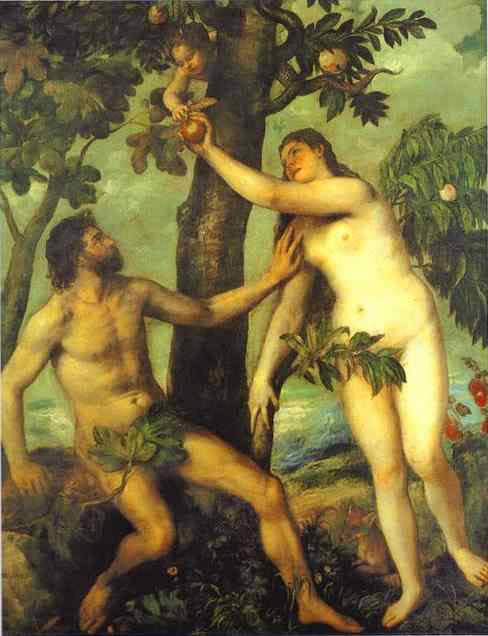
Know Your Fucking History: The Forbidden Fruit
 Baby, back up offa dat fruit. And get down from the tree; you’re a baby. You’ll fall and break your floppy skull.
Baby, back up offa dat fruit. And get down from the tree; you’re a baby. You’ll fall and break your floppy skull.
In today’s installment of Know Your Fucking History, we take a look at that one shitty little object that is the reason women have to endure the pain of childbirth and men have to endure the pain of women enduring the pain of childbirth: the forbidden fruit.
We’re just going to skip over the part where I explain to you that there’s no possible way the Garden of Eden story could have happened. Not even a remote possibility. It’s allegorically useful, I suppose, but I can assure you Big Beardy God didn’t slap together the first human with some Silly Putty and twigs and a bit of string. We could with equal plausibility suggest that the Archangel Gabriel farted in God’s face, and then God barfed out Adam onto the Earth, who was pretty bummed about the whole event because now he smells like farts and barf (So sayeth the Lord).
OK. Past that. Moving on. Regardless of the accuracy of the tale itself, the Abrahamic religions all adhere in some form to a standard origin myth, and the Old Testament/Qur’an/Torah are certainly historically and culturally relevant documents, so let’s read them as such. If popular Renaissance paintings or the title sequence to Desperate Housewives are to be believed, the forbidden fruit that Eve ate (because women are a: easily manipulated and b: like, always hungry) was an apple. Forbidden not because God wanted all the apples for himself, but because eating from the Tree of Knowledge in the Garden of Good and Evil gave Eve (and subsequently Adam) all sorts of crazy knowledge, including but certainly not limited to where penises go and what happens when they get there. Creating a delicious looking tree whose sole purpose is to not be eaten is sort of like putting a Snausage on the floor in front of your curious dog and then banishing it from the house and refusing to love it anymore when it inevitably eats it. Huge dick move.
But was it an apple? Sources say: who the fuck knows? Honestly, that’s as close as we’re ever going to get to figuring out what fruit is being referenced in the countless translations of the Book of Genesis, from Hebrew to Greek to Latin to French to Klingon to English to LOL Cat to Emoji. The apple depiction is most common in Western Europe, perhaps because in the Latin Vulgate (a late 4th century translation of the Bible from old Latin), the term mălum is used, meaning “evil,” but could easily have been confused with mālum, a Latin noun borrowed from Greek, meaning “apple.” Yes, some jittery scribe’s crap penmanship could be the entire reason we westerners picture an apple as opposed to, say, a fig (they did use fig leaves to cover up their immoral sexing parts, after all) or a pomegranate or a grape or any of the other perfectly viable possibilities that biblical historians have proffered. It’s a good thing mălum didn’t get misread as mulum, or we’d have a seriously disturbing creation myth in which Eve snacks on a freshly-plucked mule while Adam looked on in abject horror.
Transliteration problems aside, we do have one person in particular we can blame for the propagation of the apple myth: John Milton. Fucking John Milton, with his epic poem Paradise Lost that is so long and arduous that his daughter (to whom he had to dictate over 10,000 lines of verse because he was a blind old coot) probably tossed her quill across the room and shouted “Father this is so long! And arduous!” Anyway, Paradise Lost tells the creation myth, and is actually responsible for a number of popularized modern depictions of events. For example, there’s no mention of Satan embodying a snake in order to tempt Eve in the Bible, and yet that’s the understanding of how things went down, so to speak. Satan, in his skin-tight snake suit, tells Eve a pitiful story about how one day he was overcome with temptation to eat from the “goodly tree far distant to behold,” on which hung “fruit of fairest colors mixed, / Ruddy and gold…” He tasted “those fair apples,” and later bragged to his fellow exiled angels that he had tempted Man away from his Creator with an apple (Book X, lines 400 something or other). Two short mentions in a long-ass poem, but Paradise Lost has firmly tethered itself to the western consciousness well enough to make “apple “feel like fact. (An even earlier Miltonian description of the fruit as an apple can be found in his 1644 Areopagitica, but I won’t blame you for not bothering to look that up.)
I’d hoped perhaps there’d be a geographic argument to be made against apples, but it turns out – based on references to certain rivers that flowed through the Garden of Eden – its likeliest actual spot is in Cossaea, a Greek name for Elam, an ancient civilization situated in the southwest of Iran. And according to the Food and Agriculture Organization, Iran ranks fourth in apple production worldwide. So I guess good job there, Iran. Way to produce them apples.
The moral of the story: Apples=bum rap. But snakes, I think we can all agree, are nasty little fuckers. And women are sort of meh too.
Sources: The Internet, obviously.
